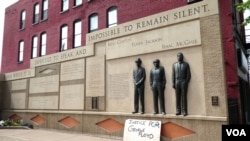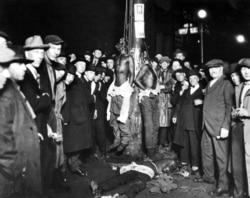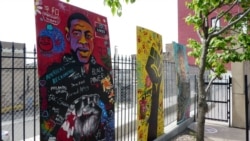Editor's note: This article contains graphic images that some might find disturbing.
On the morning of June 15, 1920, an 18-year-old man in Duluth, Minnesota, claimed that he and a young woman – both of them white – were held at gunpoint the night before by a group of black circus workers, and that the woman had been raped.
That night, a mob battered down the door of the police station and seized three of the six men police had rounded up. Isaac McGhie, Elmer Jackson, and Elias Clayton were dragged down the street, beaten, and hanged from a streetlight.
"They were dragged to this corner back here and they were lynched in front of ten thousand people, like it was a public display, like it was an event that was celebrated," said Stephan Witherspoon, president of the Duluth chapter of the NAACP, the nation's oldest civil rights organization.
A photo of the lynch mob – white men grinning as if they were a hunting party posing with trophies they killed – was sold as a postcard in stores until local officials banned their sale.
Eight people stood trial for the lynching but only three men were convicted – all for the lesser charge of rioting. None of the three served more than 15 months in prison. No one was convicted for the murders of Clayton, Jackson, and McGhie.
Max Mason, a black man who worked for the same circus as the lynching victims, was convicted of the alleged rape. He served less than five years in prison before being paroled. Last week, Mason was the first person to receive a posthumous pardon in Minnesota. In a letter supporting the pardon, the district attorney for the county in which Duluth is located wrote, "The historical record clearly reflects that Mr. Mason was investigated, charged and convicted because of his race and not because of the strength and sufficiency of the evidence."
'Modern-day lynching'
Duluth is 250 kilometers north of Minneapolis, where the death of George Floyd, an African American man who died in police custody on May 25, sparked protests, calls for policing reform, and demands to address racial issues that have lingered since the first African people were brought to North America 400 years ago.
The Clayton Jackson McGhie Memorial, located across the street from the site where the three men were murdered a century ago, became a Duluth rallying point in the wake of Floyd's death.
A week before the anniversary, community members painted murals that included images of Floyd and Breonna Taylor, an African American woman in Kentucky who was shot to death in March when police raided her home as part of a drug investigation. Candles were lit in a long row of red plastic cups, each bearing the name of an African American who died in police custody or was killed by civilians who suspected them of wrongdoing.
Witherspoon said that Floyd's death shows that, in Minnesota – and the rest of the country – racial issues still need to be addressed.
"The same stuff keeps happening, but in modern ways," he said. "That was a modern-day lynching that happened to Mr. Floyd. And so, what we need to do is face these issues, come to the table and be willing to get uncomfortable and talk about it. Because if we do not talk about it, we do not deal with it, it's going to exist for an even longer time, and we are not going to tolerate that anymore."
Floyd's death and the protests that followed inspired June Klaphake and her daughter to drive to Duluth from their home just south of Minneapolis to visit the Clayton Jackson McGhie Memorial.
"It just prompted us to just to want to be more informed as white people who live a very privileged life," Klaphake said. "It's just time. It's time for all of us to better understand our history and our part in it."
The pair listened to George Floyd's memorial service on the radio as they drove to Duluth and talked.
"We had a great conversation about what's going on in the world today," Klaphake said. "We really wanted to honor what's going on in the world today and educate ourselves and be more informed."
Witherspoon also said it's important for white people to stand up and speak out against racism, even when it's not comfortable or easy. If they do, he's hopeful that the Clayton Jackson McGhie Memorial will be a reminder of a time gone by, not a rallying point for marchers protesting future deaths.
"I am hopeful, but I'm going to be more hopeful when our allies take the charge that we want to give them," he said. "What I am saying to our allies, to our white allies, is to stand up and fight against racism even when we're not around. So, if it's in your family, if it's in your friends, if it's on the street, call it out. And make sure that you let them know – out loud – it's not acceptable anytime, anyplace, anywhere. We need our white allies to step up."










